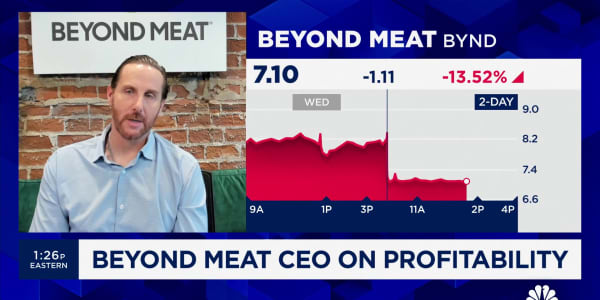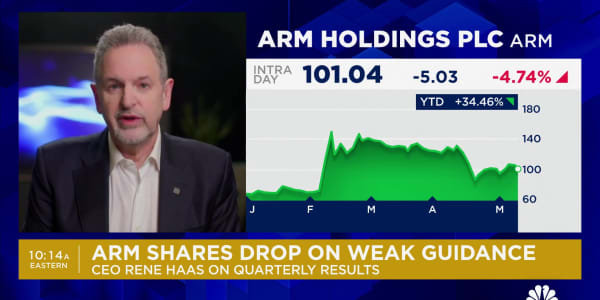Alan Greenspan said the Federal Reserve is sitting on "a pile of tinder." That "the gold standard is not possible in a welfare state." That the Fed is not "independent." That the price of gold is headed "measurably higher."
Really? The former "maestro" of the Fed said all those fairly incendiary things?
Let's just say I was highly skeptical when I first saw those words, contained in a blog post from Axel G. Merk of Merk Investments and apparently uttered at the New Orleans Investment Conference last Saturday ... and reported ... nowhere.
So I checked it out by going straight to the source—Greenspan himself.
To my surprise, he neither denied nor especially tried to walk back any of the comments after I sent him Merk's blog, which could be described fairly as an incredulous reaction and analysis. Greenspan emphasized that Merk's interpretation belonged to him, only taking issue with the context of the comments on Fed independence.

Here's what Merk, as part of his phrase-by-phrase analysis from the conference, had to say about that issue:
Read MoreMarkets still addicted to money printing
Greenspan: "I never said the central bank is independent!"
I could not believe my ears. I have had off the record conversations with Fed officials that have made me realize that they don't touch upon certain subjects in public debate—not because they are wrong—but because they would push the debate in a direction that would make it more difficult to conduct future policy. But I have never, ever, heard a Fed Chair be so blunt.
The maestro says the Fed merely does what it is mandated to do, merely playing along. If something doesn't go right, it's not the Fed's fault. That credit bubble? Well, that was due to Fannie and Freddie (the government sponsored entities) disobeying some basic principles, not the Fed.
Here's Greenspan taking issue, as expressed through an email he sent to me:
The quote on Fed independence, for example, is accurate, but requires context. Legally, actions by the Federal Open Market Committee are not subject to review or change by any other government agency. Politically, however, the law governing Fed independence has been, and I presume will continue to be, the subject of one-sided political pressure, thereby significantly limiting the FOMC's range of discretion. In the early 1990s, for example, Senator Paul Sarbanes proposed legislation to remove FOMC voting power from the admittedly hawkish presidents of reserve banks. And earlier, during the years 1980-1983 when the Federal Reserve was acting to reign in an explosive inflationary imbalance, then-Chairman Paul Volcker was under severe attack. If it weren't for the support of President Reagan, anti-independence legislation would certainly have been forthcoming.
Fair enough, but what about the rest?
I believe the quotes reflect previous comments of mine from recent books: "The Age of Turbulence" and "The Map and the Territory." Merk's interpretations are his, not mine.
In his remarks at the New Orleans conference, Greenspan, who critics fault for helping to create, through easy money policies, the housing bubble that burst and set off the financial crisis in 2008 and 2009, opined pretty freely.
Read MoreWhy the market islosing its faith in the Fed
One quote: "The Fed's balance sheet is a pile of tinder, but it hasn't been lit … inflation will eventually have to rise." He followed by telling folks not to worry because FOMC members "are very smart."
Merk's reaction:
Trouble is, if no one has noticed, central bankers are always the smart ones. But being smart has not stopped them from making bad decisions in the past. Central bankers in the Weimar Republic were the smartest of their time. The Reichsbank members thought printing money to finance a war was 'exogenous' to the economy and wouldn't be inflationary. Luckily we have learned from our mistakes and are so much smarter these days. Except, of course, as Greenspan points out it's the politics that ultimately dictate what's going to happen, not the intelligence of central bankers. And even if some concede central bankers may have above average IQs, not everyone is quite so sanguine about politicians.
Greenspan also had some colorful comments at the conference on gold, including this gem: "The gold standard is not possible in a welfare state." Asked where he thought gold prices were going, Greenspan replied, "measurably" higher.
Merk points out that Greenspan never explicitly called the U.S. a welfare state, but said the inference was there. There also apparently was a related exchange with "Dr. Doom" Marc Faber, who "expressed his view, and displeasure, that the Fed has been financing social programs" through helping to buy up U.S. debt.
According to Merk's account Greenspan said "'you have it backwards.' Greenspan argued that it's the fiscal side that's to blame. The Fed merely reacts. Doubling down on the notion, when asked how a 25-fold increase in the Consumer Price Index or a 60-fold increase in the price of gold since the inception of the Fed can be considered a success, he said the Fed does what Congress requires of it. He lamented that Fed policies are dictated by culture rather than economics."
Read MoreMarkets cheer Japan's double whammy
Those of us who have followed him and reported on him over the years know that as chairman he was prone to obtuse statements which the market learned to interpret. In his post-chair days, he's become even more unpredictable.
To Merk, the comments were worthy of turning the "don't fight the Fed" maxim into "fear the Fed" (my words, not his).
A final bit of his analysis:
We now have a "box of tinder" and an admission that the Fed is merely there to enable the government. We are not trying to scare anyone, but summarize what we heard. My own takeaway from Greenspan's talk was that anyone who isn't paranoid isn't paying attention.






